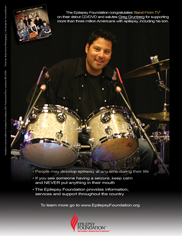
Archived // Philanthropist Spotlight

Mike McGalliard: Making It Count
By: Mimi Makabi
By: Mimi Makabi
In 1996, CPP then became part of The Fulfillment Fund (a college access organization). For eight years, McGalliard managed CPP and spearheaded its expansion across all areas, playing the key role in the development of all curriculum materials, teacher training and community partnerships. Starting in only two high schools and working out of the co-founders’ homes, CPP served 1,000 students at ten high schools with an operating budget of $1.2 million. It generated a high school graduation rate of over 90% and a college matriculation rate of 86% for students in Los Angeles’ most disenfranchised schools.
While students in some schools surely benefited from this unprecedented private generosity, the system as a whole still needed improvement. Then one day as McGalliard sat at a coffee shop, while sipping on lattes with one of his oldest friends, John Holcomb (vice president and co-founder of Mentor LA)—they began brainstorming and thought, “Hmmmm? What can we do next that is bigger and better?” That’s when McGalliard left CPP in early 2003, along with his colleague John Holcomb, to open The Center for Innovative Education (i.e.). “After years of doing CPP, even though we loved the work and the success was undeniable, we looked at the schools that we were operating in and said, ‘They have to get better’. We founded (i.e.) to solve the problem. Schools were inefficient. They were ineffective. They didn’t know how to allocate resources equitably,” explains McGalliard. He knew early on, that in order to improve the educational system in these disenfranchised communities, he first had to empower the schools.
Looking back, McGalliard explains his frustration towards the system. “I thought what an inefficient use of resources. This would never happen in a good business—but it happens in schools. That baffled us, so we said, ‘Let’s solve that problem.’ Let’s solve all the other core deficiencies that we found in the schools. Considering that a lot of teachers are under equipped, let’s help train them better. And let’s not stop there. Let’s work with the school’s leadership- the Principals. Yes, we are not principals, but we can help them think about strategic planning and think about the bigger questions just like a CEO might think about at a successful business.”
The Center for Innovative Education’smission became to revitalize urban public schools by advancing the development of teachers and school leaders, and facilitating creative redesign of low-performing high school campuses. McGalliard adds, “We were helping schools become entrepreneurial and over time we changed our name to ‘Mentor LA’, because we liked the idea that we were mentoring schools to provide better services to the children. By the schools becoming more productive places, the kids had greater opportunities to flourish.”
In 2006, (i.e.) was officially re-incorporated as MentorLA, while it continued its mission:‘to improve schools and empower neighborhoods in LA's most disenfranchised communities’. “We are all about LA—born and bred. LA is unique and has its own way of doing things. It has its own problems and needs an effort that is born in LA—and that’s what this is. We represent the collective mentor to the city of Los Angeles, working together to make LA a better more equitable city,” says McGalliard.
Today, MentorLA pioneers a new approach to public schooling that unites equity, access, and innovation through an unprecedented collaboration between the private and public sectors. McGalliard affirms, “Education needs to be in the public realm. Every kid deserves a great education. It’s the public’s responsibility to provide it, but they can get this private sector injection to help make it great—and that’s what we are to public schools.” He continues, “Our role at MentorLA is to equip the schools and build their entrepreneurial capacities. The schools’ administrations get assigned mentors who are actually on site and become a permanent structure at the campuses. By being on the grounds, in deep, and part of their team, we can influence dramatic change—and then, the potential is limitless!”
While students in some schools surely benefited from this unprecedented private generosity, the system as a whole still needed improvement. Then one day as McGalliard sat at a coffee shop, while sipping on lattes with one of his oldest friends, John Holcomb (vice president and co-founder of Mentor LA)—they began brainstorming and thought, “Hmmmm? What can we do next that is bigger and better?” That’s when McGalliard left CPP in early 2003, along with his colleague John Holcomb, to open The Center for Innovative Education (i.e.). “After years of doing CPP, even though we loved the work and the success was undeniable, we looked at the schools that we were operating in and said, ‘They have to get better’. We founded (i.e.) to solve the problem. Schools were inefficient. They were ineffective. They didn’t know how to allocate resources equitably,” explains McGalliard. He knew early on, that in order to improve the educational system in these disenfranchised communities, he first had to empower the schools.
Looking back, McGalliard explains his frustration towards the system. “I thought what an inefficient use of resources. This would never happen in a good business—but it happens in schools. That baffled us, so we said, ‘Let’s solve that problem.’ Let’s solve all the other core deficiencies that we found in the schools. Considering that a lot of teachers are under equipped, let’s help train them better. And let’s not stop there. Let’s work with the school’s leadership- the Principals. Yes, we are not principals, but we can help them think about strategic planning and think about the bigger questions just like a CEO might think about at a successful business.”
The Center for Innovative Education’smission became to revitalize urban public schools by advancing the development of teachers and school leaders, and facilitating creative redesign of low-performing high school campuses. McGalliard adds, “We were helping schools become entrepreneurial and over time we changed our name to ‘Mentor LA’, because we liked the idea that we were mentoring schools to provide better services to the children. By the schools becoming more productive places, the kids had greater opportunities to flourish.”
In 2006, (i.e.) was officially re-incorporated as MentorLA, while it continued its mission:‘to improve schools and empower neighborhoods in LA's most disenfranchised communities’. “We are all about LA—born and bred. LA is unique and has its own way of doing things. It has its own problems and needs an effort that is born in LA—and that’s what this is. We represent the collective mentor to the city of Los Angeles, working together to make LA a better more equitable city,” says McGalliard.
Today, MentorLA pioneers a new approach to public schooling that unites equity, access, and innovation through an unprecedented collaboration between the private and public sectors. McGalliard affirms, “Education needs to be in the public realm. Every kid deserves a great education. It’s the public’s responsibility to provide it, but they can get this private sector injection to help make it great—and that’s what we are to public schools.” He continues, “Our role at MentorLA is to equip the schools and build their entrepreneurial capacities. The schools’ administrations get assigned mentors who are actually on site and become a permanent structure at the campuses. By being on the grounds, in deep, and part of their team, we can influence dramatic change—and then, the potential is limitless!”
PAST ISSUES // Philanthropist Spotlight
©2011 CELEBRITY SOCIETY
9606 SANTA MONICA BOULEVARD | THIRD FLOOR | BEVERLY HILLS, CALIFORNIA 90210
CONTACT@CELEBRITYSOCIETY.COM | 310.859.6654
9606 SANTA MONICA BOULEVARD | THIRD FLOOR | BEVERLY HILLS, CALIFORNIA 90210
CONTACT@CELEBRITYSOCIETY.COM | 310.859.6654




























